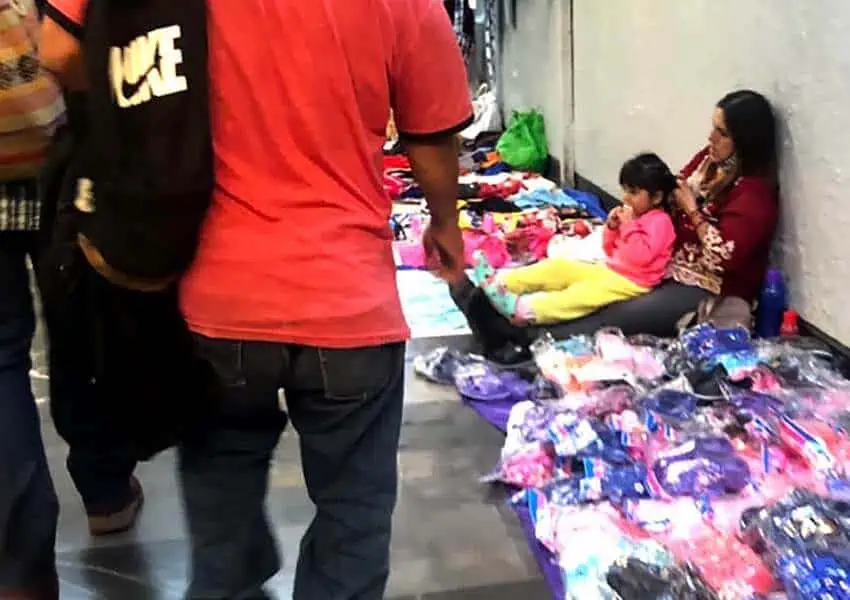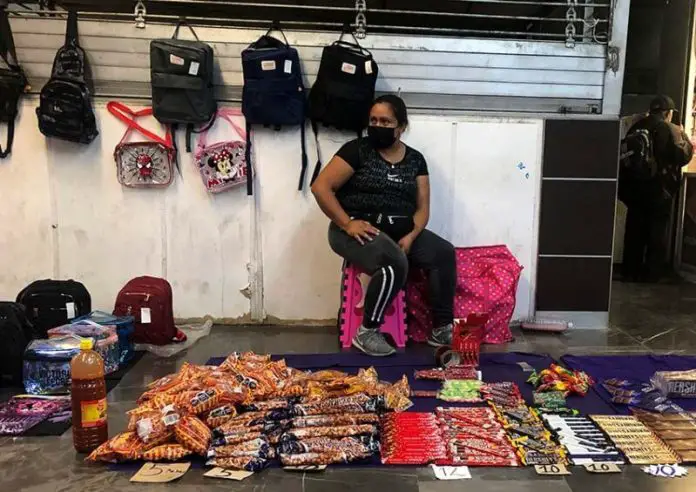If you have been on the Mexico City Metro at any point in the past year and a half, you have seen them: hundreds of women selling trinkets on blankets along hallways and around corners of the subway stations.
They sell face masks and hair bands, handmade jewelry and used clothing. The signs that hang behind them say “Women in the fight!” and other protest phrases. Once in a while, a vendor yells a feminist chant aloud, and the others answer her call.
When asked, these vendors say they are involved in a peaceful economic protest — some say against sexism and others say against the unemployment they face as women in the city. None of them are willing to give their names when interviewed, and few are willing to be photographed.
“There are certain stations now that they have completely shut us out of,” a vendor says at the Centro Médico Metro station. She is young, likely under 30, fidgeting with a brightly colored face mask that keeps slipping down under her nose. She has been here since the beginning of the pandemic. Other women direct me to her as the person that can speak about the movement.
She tells me that women here are simply looking for a way to feed their families, that many, if not most of them, are single mothers. Before COVID-19, this particular vendor was selling jewelry and candy on the sidewalk outside her daughter’s school, but once the pandemic began, police forced her to leave.

Other women also lost jobs due to COVID; many selling like her in other locations were forced to leave, she said.
According to city law, selling anything in the Metro, Metrobus or Cablebús stations is illegal, but these women insist that their situation, aggravated by the pandemic, justifies reevaluating that prohibition.
In May of 2021, Julio Santella, the head of Mexico’s National Institute for Statistics and Geography (INEGI) said that female unemployment had risen 84% from May 2020. In the same period, eight million Mexicans joined the ranks of the informal economy, an increase of 35% from the year before. In August, INEGI reported that informal jobs were now 78% of the overall Mexican workforce.
In Tacubaya, a young twentysomething woman with a sweep of bangs and a black face mask sells next to her friend. The friend lives in the capital, but she’s from México state and brings her young son with her into the city each day to sell at the Metro.
“If a woman comes and says she doesn’t have any money to start her own business, we put together a collection,” she says, “We help each other. Because we’re women. If we attacked each other, then what?”
I ask her if it’s working, selling in the Metro, if she’s making any money. “It’s enough to eat,” she replies.

According to another vendor, the women are organized into a loose system of collectives throughout all the Metro stations in the city. They meet and communicate with each other and have organized in-person protests outside the Metro, like one that occurred in early October in front of the Bellas Artes performing arts center.
The collectives are closed to new vendors right now because the women have decided that any more sellers and it will “start to look like a tianguis in here,” she says, referring to Mexico’s crowded outdoor markets.
The push and pull between vendors and local government has a long and sordid history in Mexico City. Several city administrations have carried out campaigns to rid specific areas (e.g., the zócalo) of vendors or prevent specific types of vendors (CD sellers on the Metro) from being a “public nuisance” to tourists and locals. But the pandemic has brought this conflict into sharper focus, with vendors insisting that they must go out and make a living in the public space in order to survive and police and local government telling them they must stay home.
In August of 2020, roving vendors known as ambulantes in the city’s historic downtown asked the Mexico City government to stop what they considered their violent expulsion from certain areas of the city by the local police. The story of Lady Tacos de Canasta, a well-known Mexico City street food vendor forcibly ejected by police at the height of the pandemic (whom the world met on the Netflix documentary series The Taco Chronicles) was a visible example, but it was just one of many other unseen clashes between local police and vendors.
While the vendors at Centro Médico say the police there don’t bother them too much, they have seen other situations where women physically resisted expulsion. Many have their small children at their side. Often there are babies sleeping among the pink pencil erasers and sparkling rainbow backpacks.
“My 15-year-old daughter, she’s kind of like the mother of the house now,” one Centro Médico vendor says, explaining that she leaves food prepared in the morning for her children to eat in the evening. Her daughter makes sure her younger sibling is fed.
How long will their protest continue? None of them really know, but for now they will continue to arrive at 5:30 a.m. and sit with their goods, hoping for customers and a few pesos at the end of the day.
As many expressed when interviewed, they feel they have no other choice.
Lydia Carey is a regular contributor to Mexico News Daily.
